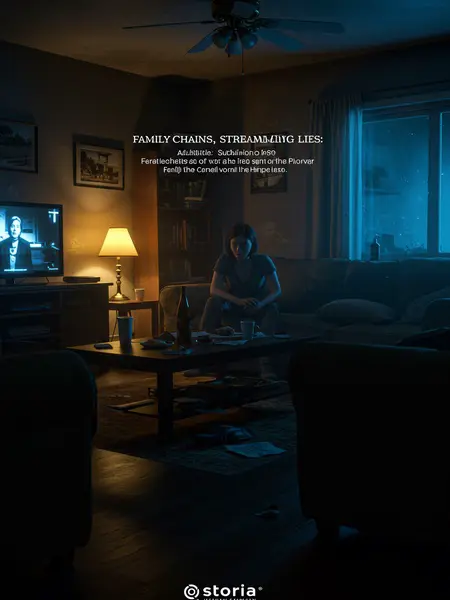Chapter 2: The Chain Breaks
I never imagined Heaven would actually let me be reborn on this day.
The light through the window looked exactly the same, but my heart pounded with new resolve. I scanned the room, every detail etched in my memory—the worn linoleum, the smell of cheap instant coffee, the dull ache in my chest.
I forced a smile. "Oh, Uncle Dave, who told you there’s money to be made online? It’s really not much."
I made sure my voice sounded casual, my shoulders hunched, like I was already defeated. No way I’d give them the opening they wanted.
Hearing that it wasn’t profitable, Dad’s face darkened. He glared at me, his hands twitching, jaw clenching. I recognized the storm brewing—his pride wounded, his dreams of easy money slipping away.
"Not making money? All day long yelling like a lunatic! If you don’t get out there and work, what about your brother’s tuition and living expenses? Your mom and I are counting on you to support us in our old age."
It was always about duty, about what I owed. Never once about what I wanted.
Caleb was the only college student in the neighborhood, the pride of my parents.
Every time he came home in his college hoodie, Dad made sure the whole block knew. Bumper sticker on the car, framed acceptance letter on the wall—my brother was the golden child.
And me? I’d gotten into college, too.
But no one ever bragged about that, because I gave it up before I could even set foot on campus.
They wept and begged, saying the family was too broke to send both of us. So I gave up my spot, packed my bags, and went to Ohio.
The memory still stings. Mom pressed a ten-dollar bill into my palm, crying, "We just want what’s best for everyone." I left with a duffel bag and a head full of broken promises.
With only a high school diploma, I could only work in an electronics assembly plant.
I spent my days hunched over conveyor belts, my hands aching from repetitive motions, my ears ringing from the constant clatter. There were no promotions, no futures—just shift work and overtime.
Working overtime day and night, I got sick, but I refused to spend money on a doctor—every penny saved went home, so my brother could study without worry.
I skipped meals, patched up my sneakers with duct tape, and kept a spreadsheet of every dollar sent back. The more I gave, the more my parents expected.
Even though colleges had expanded enrollment, few in Maple Heights sent their kids to college. Most just started working as soon as they turned eighteen.
Kids I grew up with worked at the car wash, the gas station, or the grain elevator. College felt like some distant planet. I wanted to believe my sacrifice meant something.
I carried the burden so my brother could go to school, promising him that if he got into college, I’d support him.
We made a pact, just the two of us. I told him, "You make it, I’ll back you up." At the time, it felt noble.
But it was this very brother who, when I was at my lowest, kept provoking Dad to torment me, sending me into relapse after relapse.
Caleb always knew just what to say to light Dad’s fuse. Whenever things got tense, he’d bring up my failures, twisting the knife just enough to keep me down.
"Oh, Marcus, look how angry you made your dad. He thought you could make big money for the family," Uncle Dave added, voice dripping with fake sympathy, a smirk at the corners of his mouth.
"That’s right, your dad says you act weird at home, always jumping and shouting. We’re just worried about your mental health," Aunt Linda chimed in, rolling her eyes as if she was already calculating what she could get out of my downfall.
"Look at you, doing nothing at home like a useless lump. Your parents are getting old. They raised you, and you don’t even know how to care for them?" Aunt Sarah tossed in, her words sharp and practiced.
My heart trembled—here it comes again.
I clenched my fists under the table, feeling the walls closing in, the same cycle about to repeat.
In my last life, I gave them everything. How did they repay me?
I kept asking myself—was it worth it? All those sleepless nights, all those paychecks sent home?
They knew it was my hard-earned money, but they turned a blind eye, lying through their teeth.
They clapped me on the back but couldn’t meet my eyes. Not once did anyone say thank you.
Claiming my money was dirty, yet spending it faster than anyone.
They loved the gifts, the upgrades, the security. But when the gossip started, they hung me out to dry.
Bleeding me dry, feasting on my misery, cashing in on every sacrifice.
I was just an ATM with a face—nothing more. My name only mattered when the bills came due.
How could they live so well with that on their conscience?
It was a question that haunted me. Maybe some people just never feel guilt—especially when they think it’s all owed to them.

